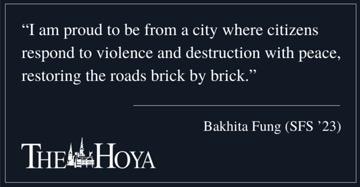A part of me feels unprepared to read the news every morning for fear of what my city has become. Hong Kong, the place where I lived all 18 years of my life before coming to Washington, D.C., has been the center of anti-government protests for the past six months. Recent stories have only just begun to reveal the extent of the damage incurred at Hong Kong Polytechnic University, which was caught in the crossfire between radical protesters and police last month.
This is not the Hong Kong I know.
It is difficult to imagine that the campus where I performed my first ballet recital was also the place where 3,989 petrol bombs, 1,339 pieces of explosives and 601 bottles of corrosives were found after a standoff between police and barricaded students. Pro-government and pro-democracy figures have been victims of a string of stabbings, the metro system still closes down early to minimize the risk of vandalism and many citizens do not feel safe enough to go outside. Something needs to change.
The protests began July 9 in response to a bill that proposed the allowance of extradition to mainland China; hundreds of thousands of opponents took to the streets for fear that the bill, if passed, would undermine Hong Kong’s judicial independence and endanger political dissidents.
At the heart of the protests lies a deep-seated conflict between pro-establishment and pro-democratic forces with regards to the “one country, two systems” policy. Agreed to when Britain handed Hong Kong to China in 1997, the policy planned to keep Hong Kong a distinct political, socioeconomic and legal system under a unified China for 50 years. Yet Beijing does not want a democratic Hong Kong, and Hongkongers believe the Chinese government will never allow for genuine political freedom.
As clashes between police and protesters become more frequent, violence has become the norm, and there have been no signs of compromise. Even after the bill was withdrawn, protesters claimed it was “too little, too late.” Since then, an 18-year-old protester was shot in the chest with a live bullet as crowds fought police, the government has banned protesters from wearing face masks and a man has been set on fire by anti-government protesters. This level of violence is unprecedented.
Furthermore, disinformation is quickly polarizing Hongkongers. As rumors circulate on Facebook, WhatsApp and Telegram, it is becoming harder for the general public to know what to believe. Both pro-democratic and pro-establishment camps are using disinformation to wage a psychological war; thus, the damage extends beyond the violence and vandalism. There is fear, confusion and distrust.
As I tell my peers that I will be headed back to Hong Kong — a place that isn’t the same as when I left — for Christmas, some respond with pity. But Hong Kong is still home. I am proud to be from a city where citizens respond to violence and destruction with peace, restoring the roads brick by brick. Home is where 71.2% of eligible voters turn up to vote in the district council elections — seen as a symbolic referendum on the protest movements — in which pro-democracy parties took nearly 90% of the seats. Home is where people stand in solidarity to defend their freedom.
In this home, I find hope. We show up to defend our freedom, but also to defend our home by demanding an end to the violence.
The district council election results show deep discontent with Hong Kong’s current government. The government has every reason to reflect on its failures and urgently find ways to restore the trust of its people — even if that means starting difficult conversations on political reform. Furthermore, authorities should launch an independent investigation into the conduct of the police force to address grievances against police brutality.
However, the protesters also ought to be realistic about their demands and be willing to compromise if they truly believe in a future for Hong Kong. For example, granting blanket amnesty to all those arrested would only serve to undermine the justice system that we Hongkongers so pride ourselves on. Therefore, it is clear that both sides must be willing to return to the negotiating table and make concessions to repair the damage.
It has been said that Hongkongers have long had a reputation for resilience, adaptability and pragmatism. Let us live up to that reputation by defending peace when all seems lost.
Bakhita Fung is a freshman in the School of Foreign Service.









